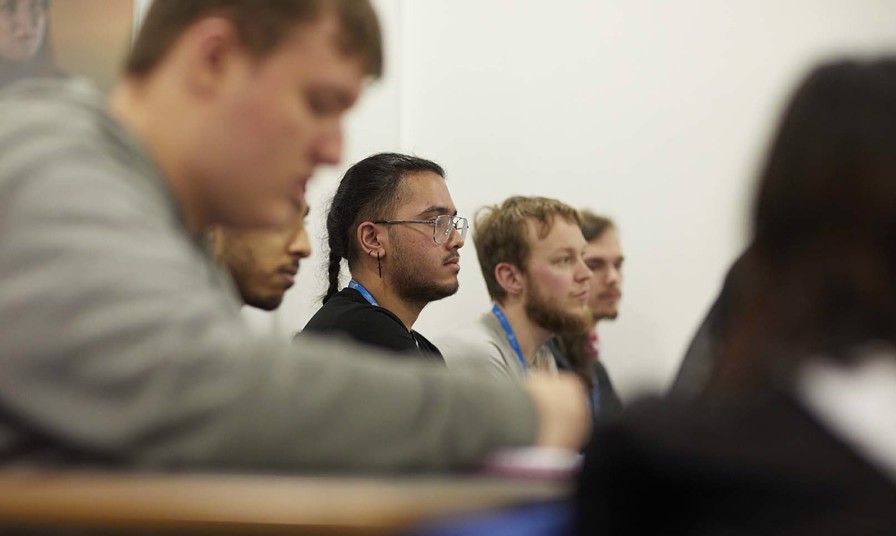Entry Requirements
Minimum of 32 UCAS points from relevant fields
Study Mode
Full time
Part time
Duration
Full time:
1 year
Part time
2 years
Timetable
Various
Key Features & Benefits
- Study in our dedicated University Centre
- Fit your studies around existing commitments
- Benefit from smaller class sizes, more 1-to-1 support and accessible resources
- Unrivalled support - from Academic Coaches to Careers Advice and Disability Support
Business HND enables you to explore the major elements of business – including the business environment, marketing, human resources, management and accounting. You will gain a strong understanding of everything from business strategy to consumer behaviour and insight – developing a range of transferrable skills.
-
Overview
Business HND enables you to explore the major elements of business – including the business environment, marketing, human resources, management and accounting. You will gain a strong understanding of everything from business strategy to consumer behaviour and insight – developing a range of transferrable skills. You will also have the opportunity to develop your knowledge of brand management, social media and business intelligence.
-
What will I study?
All students take a total of 120 credits per level.
Level 4 mandatory modules include:
- Business and the Business Environment
- Marketing Processes and Principles
- Human Resource Management
- Leadership & Management
- Accounting Principles
- Managing a Successful Business Project
- Business Law
- Digital Business in Practice
Level 5 mandatory modules include:
- Research Project
- Organisational Behaviour
- Business Strategy
- Developing Individuals, Teams and Organisations
- Human Resources - Value and Contribution to Organisational Success
- Planning Social Media Campaigns
- Tapping into New and International Markets
-
Entry Requirements
To join this programme, you will need:
- 32 UCAS Tariff points if directly related to Business, otherwise 48 UCAS Tariff points
- Grade 4/C in GCSE English or equivalent Level 2 English qualification
- Good level of spoken or written English
Applicants without formal qualifications but with relevant work experience will be considered for entry to the programme subject to an interview or an appropriate diagnostic test that involves the current recommendation process.
Care Leavers or Young Carers
We want students from all backgrounds to have the opportunity to go to University. If you have spent three months or more in local authority care OR are a young carer, you will be eligible for a contextual offer. This is a grade reduction of 1-A Level grade below our standard entry requirements. For example, a standard offer of CCC, would become CCD. MMM at Level 3 Extended Diploma would become MMP. To apply we advise that you tick the box on your UCAS application which identifies you have spent time in care and to help identify you as eligible for our contextual offer.
-
How will I be assessed?
A variety of teaching, learning and assessments will be used emphasising the relationship between theory and real life issues /experience in practice. Throughout the course you’ll be assessed by: examinations:
- Examinations
- E-Portfolio
- Essays
- Reports
- Group presentations
- Simulations/role play
- Projects
- Peer assessment
Each module is formally assessed through, for example, open book examinations, group projects, essays, assignments or briefs, presentations, group presentations, portfolio building, self-assessments and peer assessments. This formal assessment will count towards your module mark and feedback is usually given within 3 weeks following the submission of your formal submission of work.
Additionally, some lecturers will provide informal feedback, for example, following an examination they may choose to work through the exam paper in a tutorial. It should be noted that feedback is part of the ongoing learning cycle which is not limited to written feedback. Other forms of feedback include one-to-one meetings with a personal tutor, dissertation and project supervision meetings, a lecturer responding to learner questions or responses during topic or situation discussions.
Feedback is intended to help you learn and you are encouraged to discuss it with your module tutor.
-
Teaching and Learning
You will be taught by an experienced teaching team whose expertise and knowledge are closely matched to the content of the modules on the course. The team could include senior academics, professional practitioners with industry experience, demonstrators and technical officers. You can learn more about our staff by visiting our staff profiles.
Timetables
On this course, students generally spend up to 2 days a week in College, if you choose to study the course full-time. As all course timetables are subject to change you should not make definite plans based on this information; this information is intended as a guide only. Please remember that you will be expected to carry out work in your own time in addition to the time you spend in College.
Overall Workload
You overall workload consists of class contact hours, around 15 hours of independent learning and assessment activity and any field trips which may take place.
Academic Support
We have a dedicated Student Engagement Team who will be able to provide support in the following areas:
- Study Skills (including reading, note-taking and presentation skills)
- Written English
- Academic Writing (including referencing)
- Research Skills
-
What can I do next?
Students who successfully complete this qualification may progress onto a relevant degree top-up programme or seek graduate roles.
-
Fees and Financial information
Going to University is not as expensive as you think. There are no upfront fees to pay if you take out a Tuition Fee Loan from Student Finance England. Don't forget to apply as early as possible to secure your fees before you start your course.
-
Supplementary Information
Validated by- Pearson

95.8%
Highest in the area for students feeling supported by teaching staff in their learning.














